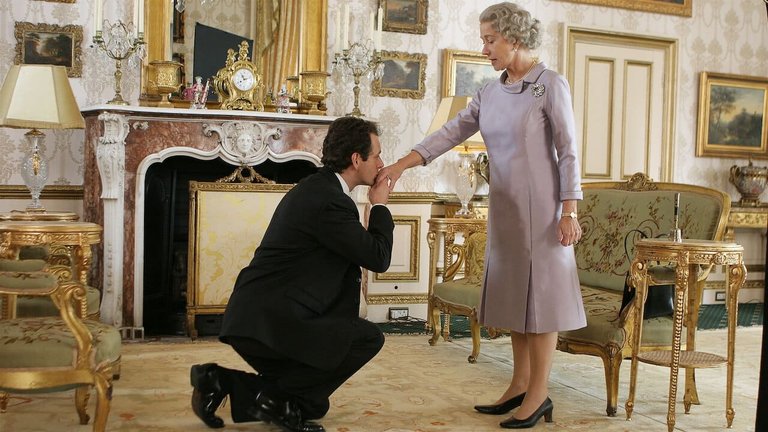Retro Film Review: The Queen (2006)

Oscar-baiting films are typically biographies of individuals who have, in one way or another, been affected by some severe physical or mental defect, which should allow actors—who are at least theoretically healthy—to demonstrate more artistry or, more often, hysterical overacting than is usually the case. In the case of Helen Mirren and The Queen, a 2006 film directed by Stephen Frears, the irony is that the main defect of the character she portrayed was a lack of or inability to display any emotion.
The plot begins in the spring of 1997 when British Queen Elizabeth II (played by Mirren) receives the tenth Prime Minister in her decades-long reign. Tony Blair (played by Michael Sheen) is the new, youthful, and dynamic Prime Minister whose Labour Party has just ousted the Conservatives after a record electoral victory under the slogan of radical social change, and whose wife Cherie (played by Helen McCrory), as a Catholic and supporter of a British republic, sees the Protestant queen and monarchy as an embodiment of everything that is wrong in the country. A few months later, Elizabeth’s former daughter-in-law Diana dies in Paris, and Blair, as a skilled populist, strikes a chord with the sentiment of a shocked and grieving nation with a moving speech about the "people's princess." Elizabeth, however, adheres to tradition and protocol, insisting on a private funeral and refraining from public comments. Because of this, she becomes a target for tabloids, as well as a part of the public whose grief has turned into anger that must be directed at someone or something. While her husband Philip (played by John Cromwell) and the Queen Mother (played by Sylvia Syms) insist on maintaining old customs and resisting the "hysterical mob," Blair, with the discreet help of Prince Charles (played by Alex Jennings), tries to persuade her to change her mind and go public to "save the monarchy from itself."
The Queen is a British film in the most positive sense of the word—superbly written, very well directed, and, most importantly in the whole story, brilliantly acted. Helen Mirren has performed the thankless task of portraying a real person very well—her portrait of Elizabeth II appears authentic but is not mere imitation. In many ways, The Queen functions as a very good docudrama—a genre in which British authors, especially those in television, are far superior to their American counterparts.
However, while The Queen meets the criteria in a formal sense, it represents a significant disappointment in terms of content. This primarily relates to the question of whether, in Elizabeth's long life and reign, among numerous dramatic events, the death of Princess Diana was indeed the most important or at least the most dramatic. Given the symbolic role of the queen in the British constitutional system, the entire alleged dispute over the character of the princess's funeral and protocol represented a storm in a teacup with a clearly predictable outcome. The real question is, of course, one that this film does not actually pose—was Princess Diana, as a sort of spiritual grandmother to modern social media influencers, a bubble deserving of such heart-wrenching, and in many cases hypocritical, expressions of grief? Similarly, one might ask whether Elizabeth, who grew up under German bombs and was raised to maintain a stiff upper lip, was far more right than the "cool" public of Britain in the 1990s, where all major problems were considered resolved, and drama was made from the death of a spoiled and emotionally unstable celebrity.
The real reason one might say that Frears, together with his screenwriter Peter Morgan, missed the whole point is that, in fact, the true protagonist of the film is not the queen, nor should she be the subject of that conflict. Instead of focusing on Elizabeth, the film should have focused on her tenth Prime Minister, especially in the context of later events, when at the end of Blair's decade in power, many had a very different opinion of the Labour leader than they did at the beginning. Many will find Blair’s reasoning for becoming the self-proclaimed saviour of the monarchy as an explanation for why he, the embodiment of everything progressive, "cool," and "politically correct" in the Western world, ended up as George W. Bush’s poodle. However, the film's creators could not ask, or perhaps—like many of Blair's former or current supporters who made up the bulk of the media and cultural establishment in Britain—answer those uncomfortable questions. Due to the lack of an adequate context or any political or social relevance, The Queen comes across as an unfinished film and was forgotten as soon as it fulfilled its purpose and delivered the long-deserved golden statuette to the lead actress.
RATING: 6/10 (++)
Blog in Croatian https://draxblog.com
Blog in English https://draxreview.wordpress.com/
InLeo blog https://inleo.io/@drax.leo
Hiveonboard: https://hiveonboard.com?ref=drax
Rising Star game: https://www.risingstargame.com?referrer=drax
1Inch: https://1inch.exchange/#/r/0x83823d8CCB74F828148258BB4457642124b1328e
BTC donations: 1EWxiMiP6iiG9rger3NuUSd6HByaxQWafG
ETH donations: 0xB305F144323b99e6f8b1d66f5D7DE78B498C32A7
BCH donations: qpvxw0jax79lhmvlgcldkzpqanf03r9cjv8y6gtmk9